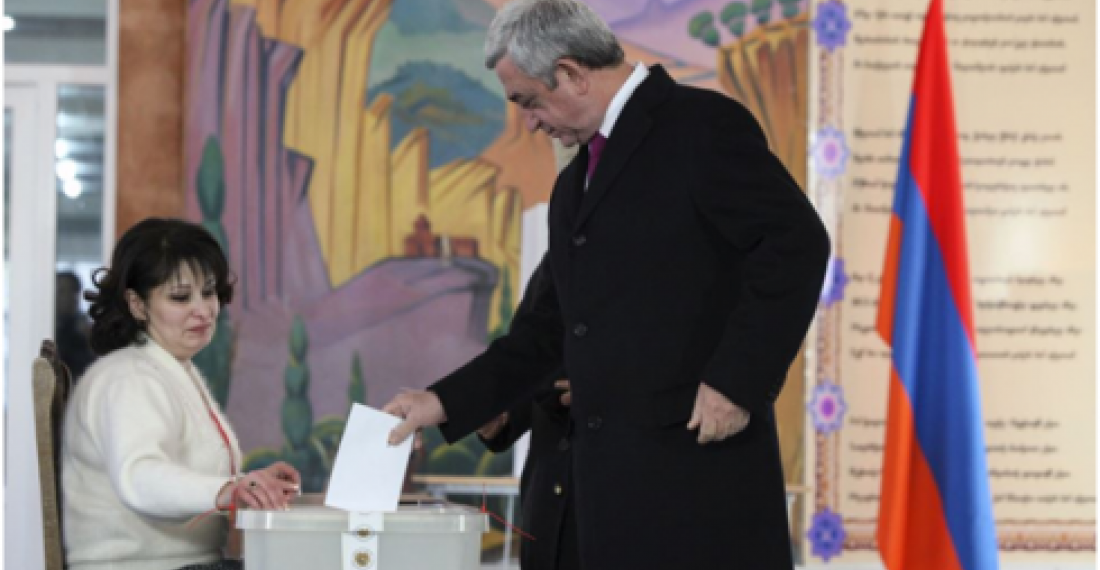Armenia, Azerbaijan and Georgia recently celebrated their 25th anniversary of independence. In all three change is perceived as necessary to respond to economic challenges, and address increasing demands by a new post-soviet generation who no longer accept the certainties of the past, and have different demands and expectations.
Change does not need to come through revolutionary means. Indeed, what happened in Georgia in 2003 - often referred to as a revolution - was more akin to a series of political actions triggered by very specific circumstances that do not now exist in any of the three countries. Armenia, Azerbaijan and Georgia do not need a revolution, but they do need to have the mechanism for change to happen when there is popular demand for it.
At present, only Georgia has that mechanism. The 2012 election saw a peaceful transition of power through the ballot box. The 2016 election, just completed saw a marked change in the way Georgians do politics. Big changes are now taking place within the Georgian political parties as a consequence of the elections, and the results which they produced. This all indicates a bottom-up process where the people are empowered through their vote to adjust the political process. The fact that Georgians voted back-in the Georgian Dream government, with an increased majority, does not mean that the Georgian people do not want change. Indeed, change is what the winning party has promised, and what they now must deliver. A new set of politicians have now started making their mark on Georgian politics - the elections showed that despite all the difficulties they are able to give Georgia a new kind of politics. Constitutional changes that are on the agenda will give all of them an opportunity to prove themselves.
In Armenia and in Azerbaijan the need for change is felt even more acutely than in Georgia, and the presidents of both countries have spoken about this need too. The process however is being driven top-down. This opens the two governments to accusations that they are not seeking real change, but simply cosmetic action that will ensure their continuity in power. This may be part of the story, but not the whole story.
In Azerbaijan a reasonably young president, has for the last thirteen years had to co-exist with an immediate surrounding of octogenarians who have held a grip on the government for several decades, and who have resisted change, except in its most superfluous forms. Russia sees them as its most trusted friends. Whilst still powerful, their roles are increasingly unsustainable.
Economic challenges are forcing Azerbaijan to embrace change. Azerbaijan had hardly got time to get used to the idea that it was a prosperous oil producing country before the price of oil collapsed. For the last three years Azerbaijan has struggled to find a new economic model, if possible one without any political strings. It has looked hard at countries such as Malaysia and South Korea, but even these models required a level of reforms and change, for which the old guard are not ready.
Whilst Ilham Aliyev has tried to push a managed top-down reform agenda, the system that surrounds him, and still dominates the government, thwarts these efforts at every opportunity. Aliyev is pushing for change, but what and how is still shrouded in mystery. Constitutional changes were voted in, in September. They create the possibility of pushing some of the old guard up into glorified positions, whilst taking away from them the leverages of power they still exert. If that happens Ilham Aliyev may at last become his own man, but the process is fraught with risk. Change in Azerbaijan is ongoing this autumn, but the results remain to be seen.
Armenia has also enacted constitutional changes recently. It will become a parliamentary republic, similar to Georgia, when the term of the current president Serzh Sargsyan, expires in April 2018. Opponents of Sargsyan say that the changes were introduced so that Sargsyan can remain in power as Prime Minster after he completes his two terms as president. Sargsyan recently appointed a new Prime Minister, Karen Karapetyan, who also talks about change. From what Karapetyan has said so far he is determined to give the Armenian government a good shake up - at least as far as economic governance is concerned, even if this requires him clipping the wings of some within the ruling elite. Karapetyan is seen as being Moscow's man, and limited change is also seen to be in Moscow's interest. Putin's administration Armenia may become an economic black hole, increasingly requiring Russian financial support. On the other hand, Moscow is wary that change may lead to unpredictable consequences. Armenia, with Moscow's acquiescence, has therefore embarked on a process of managed change, which may not be enough.Critics of the government say that Armenia's current problems are far more serious and deep rooted, and a simple change in the economic management model - as seems to be the choice of both Karapetyan and of Russia, will simply not be enough.
In both Armenia and in Azerbaijan there is a need for the political process to be opened-up and for new ideas to be embraced not shunted in short for a genuine democratic model that absorbs changes peacefully and through constitutional means. Time will tell if what is ongoing this autumn will eventually lead to these objectives to be achieved.
photo: Armenian president Serzh Sargsyan voting in a Constitutional referendum in December 2015.
(picture courtesy of Reuters and RFE/RL)







